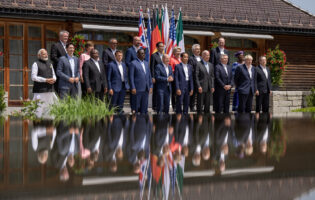Globalizing Labor Relations Across the Atlantic?
On October 20, 2010, the American-German Institute (AGI) hosted a seminar with DAAD/AGI Fellow Dr. Michael Fichter on “Globalizing Labor Relations across the Atlantic? The Role of Institutions and Actors,” which was generously funded by the German Academic Exchange Service (DAAD).
Dr. Fichter introduced the topic dealing with how German owned companies and labor relations are presented in the United States. One major impetus for his research project at AGI was the lack of empirical work on foreign companies’ appearances in the U.S., their HR management, and labor relations. The current empirical sources indicated a high rate of German investment and a strong presence of German owned companies in the U.S.
Before presenting his findings, Dr. Fichter provided some background on the academic discourses on transnational corporations and on varieties of capitalism. Regarding the former, a rich body of literature has emerged from management studies, which provides a theoretical framework for analyzing organizational processes and operations of Transnational Corporations (TNC). One stream, namely new institutionalism, stresses the standardization and universality of business practices regardless of national settings. The national business system approach, on the contrary, argues that national systems and culture have a stronger impact on global corporations and force companies to adjust to national settings. The hybridization stream sees both processes taking place simultaneously. Finally, the micro-politics approach looks more at the actors than at the institutions and asserts that corporations are a multitude of internal micro-political power politics. As for the varieties of capitalism literature, Dr. Fichter explained the basic premise which distinguishes between a Liberal Market Economy (LME) and a Coordinated Market Economy (CME): Firms in LMEs, e.g., the U.S. and UK, rely primarily on markets for their business policies, whereas in CMEs, e.g., Germany or Sweden, firms are strategically embedded in institutional and organizational webs of coordination.
Based on these theories Dr. Fichter dealt with the following research questions:
What kinds of differences in the institutional and organizational settings can be found in Germany and the U.S. and how can they be explained?
What impact do these institutional settings have on corporate policy decisions and outcomes in regard to social responsibility, human resource management, and labor relations?
How do actors use and shape these institutional settings? How do they develop policy and strategies in this context?
In order to approach these questions, Fichter conducted interviews and examined statistics and corporate statements. His analysis of corporate statements and companies’ profiles focused on their corporate social responsibility, human resource management, and labor relations policies.
Dr. Fichter’s assessment contains four hypotheses:
1: In the U.S., German TNCs shed the coordinated market economy (CME) approach of their home country and adapt themselves to the liberal market economy (LME) environment.
2: Corporate culture and identity factors such as product standards, global branding, integrated production processes, and global human resource management policies mitigate a complete assimilation to the host country environment.
3: Labor relations are managed according to the opportunities and constraints of the host country (U.S.); functional equivalents – substitutions, e.g., institutional settings – are found to compensate for the absence of the home country (Germany) and its institutional and organizational underpinnings.
4: Regarding U.S. operations, corporate citizenship and the recognition of international norms (ILO, OECD, UN) are understood as abiding by the law.
The conclusion of and evidence from Dr. Fichter’s study suggest local embeddedness rather than convergence toward an overarching global policy of labor relations in TNCs. Moreover, local embeddedness is a complex policy issue. He showed that investments are not only a question of buying or building a plant in a foreign country. In a large country such as the U.S., TNC investments are more likely to be wide reaching projects with many organizational layers and multi-faceted policies involved. Particularly, labor-management relations in both the home and host country involve domestic political issues as well, such as addressing both state and federal policies and as well as the conflicting expectations of politicians with different party affiliations.







